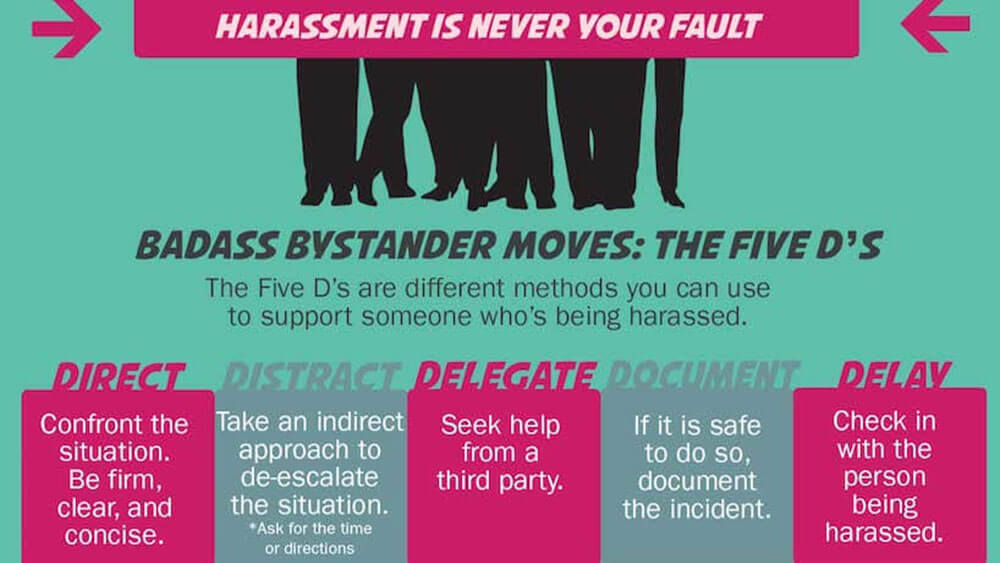Understanding the Bystander Effect

Understanding the Bystander Effect
Test your knowledge on the bystander effect, a social phenomenon that can influence people's willingness to help in emergencies. This quiz will explore various aspects of the bystander effect and its implications.
- Learn about the psychological reasons behind the bystander effect
- Discover how to overcome the challenges of helping victims
- Reflect on your own potential to make a difference
ManUp's Bystander Effect Quiz!


Take a couple minutes to see how well you score on your knowledge of the bystander effect!
Question 1: What is the "bystander effect"?
A) The psychological effect that means the more people are around in an emergency, the MORE likely you are to help a victim.
B) The psychological effect that means the more people are around in an emergency, the LESS likely you are to help a victim.
C) The sociological effect where the more people are watching an emergency, you are less likely to watch as well.
D) The physical effect of standing by someone.
Answer: B
The "bystander effect" is the psychological effect that means the more people are around in an emergency, the LESS likely you are to help a victim.

Answer: B
The "bystander effect" is the psychological effect that means the more people are around in an emergency, the LESS likely you are to help a victim.

Question 2: The "bystander effect" can affect which of the following?
A) Crimes only.
B) Medical emergencies only
C) Verbal bullying only.
D) Physical bullying only.
E) Cyberbullying only.
F) All of the above.
Answer: F - All of the above
The bystander effect affects people online in chatrooms, social media, and videogames, AND in person. The bystander effect affects crimes, other aggressive or harmful behavior, medical emergencies, and other threats.
Answer: F - All of the above
The bystander effect affects people online in chatrooms, social media, and videogames, AND in person. The bystander effect affects crimes, other aggressive or harmful behavior, medical emergencies, and other threats.
Question 3:
Click all boxes that apply:
What causes the "bystander effect" (Hint: 7/10).
People not eating a large enough breakfast means they dont have the energy to help.
People are uncertain if what they are seeing requires them to intervene/help.
People are looking to others to see how they should act. The more people there are around not stopping it, people are more likely to think other people know something they do not.
Even when people think the victim needs help, they may not feel like they know how to help.
People who see an emergency assume someone else will (or already has) intervened or helped the victim (ex. Calling police/ambulance).
People are afraid of embarrassing themselves by making a mistake or misjudgment.
People do not notice the emergency.
People want bad things to happen to others.
People do not want to single themselves out by stepping forward.
People did not get enough sleep the night before and are too sleepy to speak up.
Answer: There are many reasons people do not take positive action, including not noticing the event, feelings of uncertainty, not knowing how to respond, and fear of embarassment.
One's desire for bad things, sleep and breakfast habits have no connection to the bystander effect, even if one can argue they affect the willingness to stand up for victims.

Answer: There are many reasons people do not take positive action, including not noticing the event, feelings of uncertainty, not knowing how to respond, and fear of embarassment.
One's desire for bad things, sleep and breakfast habits have no connection to the bystander effect, even if one can argue they affect the willingness to stand up for victims.

Question 4: When bystanders do not stand up for the victim (such as someone recieving bullying online, workplace harassment, or sexual harassment/catcalling), it does not reinforce the abuser's behaviour, and does not make the victim feel isolated and alone.
True
False
Answer: False! Being a bystander and not acting does indeed reinforce the behaviour and makes victims feel like they are alone.

Answer: False! Being a bystander and not acting does indeed reinforce the behaviour and makes victims feel like they are alone.

Question 5: Fill in the blanks!
Experimental research done in 1969 published by Latané and Rodin found that _____ people would help a woman in distress when they were the only witness. But far _____ offered assistance when other people were also present.
A) "Less" and "More"
B) "More" and "Less"
Answer: B)
That study sound that while 70% of participants helped the woman when they were alone, the presence of other bystanders who could help dropped that rate to 40%!
Answer: B)
That study sound that while 70% of participants helped the woman when they were alone, the presence of other bystanders who could help dropped that rate to 40%!
Question 6: Knowing about the bystander effect has been shown to make you LESS likely to succumb to it, and MORE likely to help a victim.
True
False
Answer: True! Knowing about the bystander effect makes you less succeptible to it. Knowledge is power!
Answer: True! Knowing about the bystander effect makes you less succeptible to it. Knowledge is power!
Question 7: According to the Good Samaritan Act;
In Canada (except Quebec), if you witness an ill, injured or unconscious person at the scene of an accident or emergency, most people DO NOT have a duty to act.
However, if you do try to help the victim by providing emergency medical aid, unless you are grossly (seriously) negligent, you cannot be held responsible for negative outcomes caused by your actions.
Hint: The Good Samaritan Law in Canada encourages people to do good
True
False
Answer: True! Canada lawmakers do not want to punish people for reasonably trying to do good.

Answer: True! Canada lawmakers do not want to punish people for reasonably trying to do good.

Question 8: When one person has the courage to step forward, other bystanders who were not sure about what to do are far more likely to join and help.
True
False
Answer: True! You taking that first step can make those who were afraid to stand up feel empowered to act.
Answer: True! You taking that first step can make those who were afraid to stand up feel empowered to act.
Question 9: In the case of witnessing bullying, verbal abuse, sexual harassment/assault, if something does not seem right, you should NOT try to make sure the victim is alright, and just assume you are overreacting.
True
False
Answer: False! Never assume you're just over reacting. Don't over-escilate the situation, and dont always assume the worst, but trust your gut. Ask questions and see if the situation needs you to take further action.
Answer: False! Never assume you're just over reacting. Don't over-escilate the situation, and dont always assume the worst, but trust your gut. Ask questions and see if the situation needs you to take further action.
Question 10: Sometimes speaking up and asking other bystanders if they think that what they are seeing is wrong (whether it is a medcial emergency, bullying, harassment, etc) can help motivate you and others to ask further questions and take positive action.
True
False
Answer: True! Speaking up and asking other bystanders if they know what is going on can be a good way to get momentum and inspire positive action.
Answer: True! Speaking up and asking other bystanders if they know what is going on can be a good way to get momentum and inspire positive action.
Question 11: Click the ONE box you think is most right.
Taking positive action can look like what?
Not being accusing or confrontational, but gathering more information and asking more questions before making a decision on how to act.
Calling 911.
Asking the victim if they are ok and if you can help them.
Calmly and firmly telling the harasser or bully to stop, and that what they are doing is not ok.
Reporting it to a manager, teacher, or other person in authority.
Taking the victim away from the abuser, or otherwise separating the victim and abuser.
In the case of a medical emergency, giving first aid if you know it, or if you do not but you asked and there is nobody around who does.
Publicly standing up for the victim
Asking someone to help you
Physically intervening (possibly with other bystanders you ask for help) if you feel able, and if you reasonably believe the circumstances are serious and require immediate action to stop it and prevent serious harm to the victim.
All of the above, depending on the circumstances, what is reasonable, and what you feel capable of.
Doing nothing
Answer: "Doing nothing" is the only wrong answer. "All of the above" is the most correct answer, as all of those in various combinations can be the right answer depending on the context.
Here is a great tip for not being a bystander to harassment you see:

Answer: "Doing nothing" is the only wrong answer. "All of the above" is the most correct answer, as all of those in various combinations can be the right answer depending on the context.
Here is a great tip for not being a bystander to harassment you see:

Question 12: Taking positive action will always be met with praise and acceptance by others.
True
False
Answer: False! Often times other people respect and congratulate you on your bravery, but sometimes people react negatively to you standing up. You could have misjudged the situation. You could have done the right thing, but because of their beliefs, other bystanders might not have seen the need to act.
But don't let that discourage you. Even if you misjudge, people may appreciate the thought and effort, if you were respectful and not escilating things. Just remember, try to do good and help people, while being fair and respectful, and 99% of people will appreciate your efforts.

Answer: False! Often times other people respect and congratulate you on your bravery, but sometimes people react negatively to you standing up. You could have misjudged the situation. You could have done the right thing, but because of their beliefs, other bystanders might not have seen the need to act.
But don't let that discourage you. Even if you misjudge, people may appreciate the thought and effort, if you were respectful and not escilating things. Just remember, try to do good and help people, while being fair and respectful, and 99% of people will appreciate your efforts.

Question 13: Regardless of what you knew coming in, you are now better equipped and more likely to help someone in need
True
False
Question 14: You will make it a personal goal to be better by being a leader, not be a bystander.
Yes
No
Before we show you your quiz results, if you feel so inclined, please check ManUp out on our Facebook page and Instagram account at "ManUp Ontario" and give us a follow.

Click "Finish" to continue.
Before we show you your quiz results, if you feel so inclined, please check ManUp out on our Facebook page and Instagram account at "ManUp Ontario" and give us a follow.

Click "Finish" to continue.
{"name":"Understanding the Bystander Effect", "url":"https://www.quiz-maker.com/QPREVIEW","txt":"Test your knowledge on the bystander effect, a social phenomenon that can influence people's willingness to help in emergencies. This quiz will explore various aspects of the bystander effect and its implications.Learn about the psychological reasons behind the bystander effectDiscover how to overcome the challenges of helping victimsReflect on your own potential to make a difference","img":"https:/images/course2.png"}
More Quizzes
SOP 33-1, 33-02, 33-03
11615
LCDPS ERT Certification Exam
1050
Psychoanalytic Theory in Counseling
14731
Bilingualism: Myth or Fact
5222
Chuck Norris Age - Test Your Knowledge
201018626
Which of the Following Defines Verb Mood? Free
201015961
Should I Date My Best Friend - Get Your Answer
201017471
When Will I Find Love - Free & Instant Results
201016610
Europe Airport Codes - 3-Letter IATA Challenge
201020017
What Is Wrong With My Stomach? Free Symptom
201017538
Love Test: Are Your Feelings Real? Free Online
201016964
Veterinary Multiple Choice - Free Online
201016012